

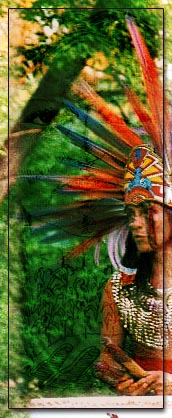
| site search by freefind |



|
|
| click photos above to view other international experiences |
PANDAY BUHAT 2000
Philippine Mentor Program
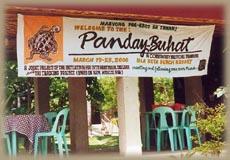 The banner for our mentor training on Isla Reta. |
After completing our work in the Hawaiian Islands last March, the Stokes family flew west from Honolulu for 13 more hours, crossing the Pacific Ocean and International Date Line for our first project in the Philippines. We took some personal time, visiting with family in Manila and Cebu, then were met by the rest of the team from The Tracking Project in Davao City, Mindanao for Panday Buhat, a week-long mentoring program organized by our partner group, Initiatives for International Dialogue (IID).
The inspiration for this joint project came from Augusto Miclat, Jr., the Executive Director of IID, who has been a member of our mentor group since 1997. After participating in our New Mexico program and sharing the skills and concepts of The Tracking Project with his staff and other NGO's from Southeast Asia, Gus and his staff felt that we should merge our teachings on natural and cultural awareness with a circle of Native and non-Native educators/ peacemakers from Sri Lanka, East Timor, Malaysia, Indonesia, Burma and the Philippines. The name Panday Buhat was chosen for the gathering, meaning "workshop" in the local dialect.
Founded in 1988, IID participates in broad-based advocacy campaigns on peace, democracy, human rights and self-determination in the Philippines and in other countries in the South. Through its Global Education Program, IID has catered to grassroots communities and non-government organizations by deepening their understanding and facilitating appreciation of international issues and how these impact on local concerns. They advocate global peace, cultural identity and diversity, self-determination, environmental concerns and human rights.
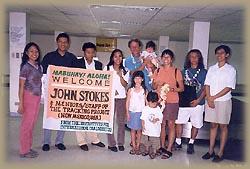 IID staff welcomes some of the Tracking Project mentors. |
Our team included: John Stokes, Nancy Latuja and children; Patricio Zamora (PAZ), dancer/artist/educator from the Ehecatl Aztec Dance Group in Albuquerque; Native elder Andy Buster of the Miccosukkee Nation and his wife, Helene, a health worker from the Seminole tribe; Keith Strever, tracker and long-time staff member of TTP and Able West, Doctor of Oriental Medicine from Santa Fe.
Participants for Panday Buhat 2000 included tribal leaders, healers, environmental activists and development workers from: IID; Popular Education for People's Empowerment (PEPE); Catholic Relief Services; Tri-People Partnership for Peace and Development; as well as musicians from the Seventh Heaven band and performing artists from various theater groups.
Several indigenous groups from Mindanao were represented, including: National Confederation of Indigenous People's of the Philippines, Panagtagbo-Mindanao and Tuddok to Kalubbaran ni Umpan (Pillars of the Descendants of Umpan). Though many people from countries outside the Philippines could not attend, we were able to meet informally with a delegate from Indonesia and a participant from Burma was able to spend the entire week with us, sharing the Burmese culture and current political situation with us.
Funding for this program was as mixed as the cultures who inhabit the islands we call the Philippines. International airfares and other expenses for the American team were provided by The Tracking Project, with the assistance of the Not Just Us foundation and the Busters, who donated their own airfares to the project. IID covered all costs of food/accomodation and travel for the team during our time on Mindanao.
"Global Inspiration Program"
After we rendezvoused with our team in Davao and met up with the IID people, we traveled together with the other participants by ferry from Davao City to Isla Reta, a "resort" on the islet of Talicud, just near Samal Island. There, on the beach under the shade of a huge tree, we conducted our week-long program of natural and cultural awareness. Based on the model established by our community mentoring project Nurturing the Roots, our daily discussions and exercises included the essential components of our curriculum: Thanksgiving, Traditional Tracking and Survival Skills, Nature Awareness, Peacemaking, Cultural Awareness, the Arts of Life, Personal Development, Community Education and International Community. We also introduced two new areas which will be added to the Reunion 2000 program this summer in New Mexico—Ceremony and Renewal.
The program was met with tremendous interest and excitement by the participants. PAZ led an informative session on Cultural Awareness which highlighted the difficulty of defining Filipino culture, the adaptability of the Filipino and the incredible melting pot which makes up the ethnicity of these Malay islands which were given the name "Las Islas de Felipinas" by the Spanish colonialists. One participant joked, "I thought this session would help me figure out who I am, but now I'm even more confused."
Especially useful, they said, was the holistic nature of our program because they had found that the needs of any community are interrelated and must be dealt with as a whole, rather than as individual and separate issues. We explained that we do not try to "educate" individuals or communities, but rather to "inspire" them to utilize our teachings and "localize" them for their own needs. The IID staff laughed, saying "Perhaps we should change the name of our Global Education Program to "Global Inspiration Program."
Each night was dedicated to the Arts of Life, with participants making presentations on their work using theater, music, song and dance. As nearly all the participants were artists of some sort, we were treated to exceptionally high-quality entertainment.
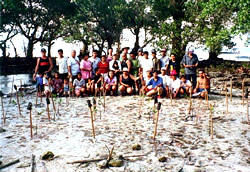 Members of The Tracking Project group and IID staff join the community on Samal Island to replant mangroves. |
Tree of Peace
Also relevant to the people of this troubled area were the teachings of the Great Peacemaker of the Iroquois confederacy and the story of how the "Great Binding Law" was established thousands of years ago in the lands of the Haudenosaunee. Using the Tree of Peace ceremony, as shown to us by our friend and elder, Chief Jake Swamp, to initiate our peacemaking section, we related the journey of the Peacemaker and his strategy for bringing a world where "thinking shall replace killing." We planted a small coconut tree, for this is widely regarded as the Tree of Peace for the Pacific region. (Chopping down a coconut tree was often used as a declaration of war in certain areas of Polynesia.)
The representative from Catholic Relief Services was especially interested in how these teachings of peace could be utilized in areas where unimaginable atrocities had been committed, such as the Killing Fields of Kampuchea or the Hutu/Tutsi conflict in Rwanda and Burundi. Memen, of IID, described the concept of "P-zones" or "Zones of Peace" where soldiers can come without arms to talk and how children should be designated as Zones of Peace. One of the indigenous members noted that the people of Mindanao were always peace-loving people, managers of bio-diversity who had kept the land in beautiful shape. Edtami Mansayagan from the Confederation of Indigenous People commented, "In order to understand ourselves, it's always good to look in a distant mirror. Indigenous people are the main victims of these wars on others. Perhaps we can use this story as a guiding star."
Peace in Mindanao
While we were on Talicud, the winds of war were palpable, though we were reassured that the area we were in was safe. In early March, Pope John Paul II made a statement asking forgiveness for the Church's treatment of indigenous people, women, heretics and Jews. He also made a statement regarding Peace in Mindanao, noting the long struggle there between Muslims and Catholics. An article sent to us by a participant from the Tri-Peace organization explains that the current struggle in Mindanao is not between Filipinos and Filipinos, nor Muslims and Christians, but rather between Bangsamoro people and the colonial Filipino government with roots that date back to the Ottoman Empire and later the infamous Treaty of Paris (1898) after the defeat of Spain in the Spanish-American War.
We cannot pretend to understand all the aspects of the current situation on Mindanao. As with the struggles of indigenous people around the world, it seems to hinge on illegal/immoral treaties from the past which continue to alienate and separate different cultures today. But we did share our teachings on peacemaking, strengthening the peacemakers who undertake this difficult work and sharing with them the Iroquois teaching that "Spirituality is the highest form of political consciousness."
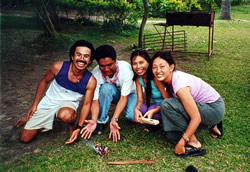 Happiness is making your first hand drill fire! |
At the conclusion of the program, our team boarded a boat and was given a tour of Samal Island, including a tree-planting ceremony we performed with some of the islanders who were working to regenerate damaged mangrove areas and a night's stay at the "Vanishing Island," a hotel on a spit of land that disappears at high tide. We were also taken to the captive breeding center of the Philippine Eagle near Davao, where dedicated workers are trying to maintain a population of Philippine "monkey-eating" eagles in the face of decimation of the eagles' habitat in the nearby mountains. There were many other parties and visits, including a trip to the Durian Park to sample this local fruit... but that's another story.
We will return to Mindanao in 2002 for the second installment of Panday Buhat. We cannot begin to thank Gus, Lyndee, the staff of IID and the participants of the project enough for the hospitality they showered upon us. From Corrales, we send our thanks and blessings to the people, the nature and the land of "Las Islas de Filipinas." Salamat until the next time.
| back to top |
Email: thetrackingproject@earthlink.net